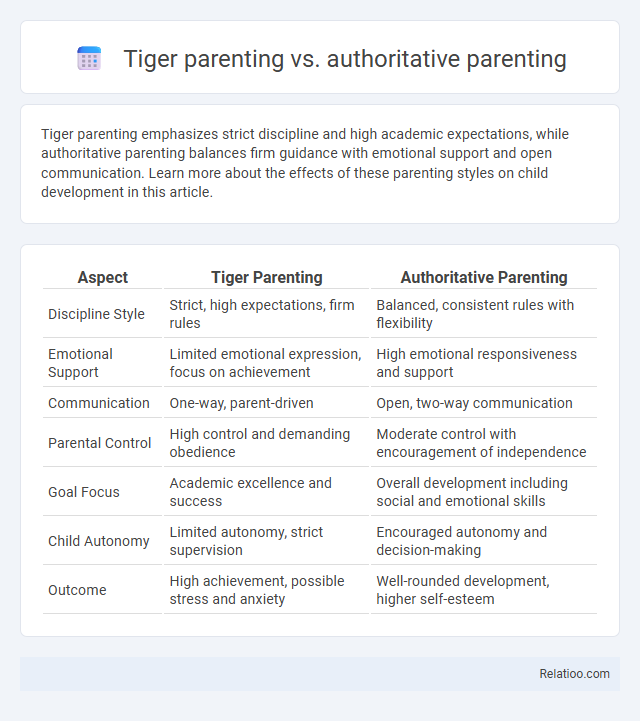Tiger parenting emphasizes strict discipline and high academic expectations, while authoritative parenting balances firm guidance with emotional support and open communication. Learn more about the effects of these parenting styles on child development in this article.
Table of Comparison
| Aspect | Tiger Parenting | Authoritative Parenting |
|---|---|---|
| Discipline Style | Strict, high expectations, firm rules | Balanced, consistent rules with flexibility |
| Emotional Support | Limited emotional expression, focus on achievement | High emotional responsiveness and support |
| Communication | One-way, parent-driven | Open, two-way communication |
| Parental Control | High control and demanding obedience | Moderate control with encouragement of independence |
| Goal Focus | Academic excellence and success | Overall development including social and emotional skills |
| Child Autonomy | Limited autonomy, strict supervision | Encouraged autonomy and decision-making |
| Outcome | High achievement, possible stress and anxiety | Well-rounded development, higher self-esteem |
Introduction to Parenting Styles
Parenting styles significantly influence a child's development, with Tiger parenting emphasizing strict discipline and high expectations, while Authoritative parenting balances firm boundaries with empathy and open communication. Understanding these approaches helps you tailor your parenting to encourage resilience, independence, and emotional growth. The choice between Tiger, Authoritative, and other styles shapes your child's academic success and psychological well-being.
What is Tiger Parenting?
Tiger parenting is a strict, high-expectation parenting style characterized by rigorous discipline, emphasis on academic excellence, and limited tolerance for failure. Unlike authoritative parenting, which balances warmth and structure, tiger parents prioritize achievement and obedience, often using intense pressure to motivate their children. This method can lead to high academic success but may also cause stress and impact emotional well-being.
Defining Authoritative Parenting
Authoritative parenting is defined by a balanced approach combining high responsiveness with high demands, promoting open communication and fostering independence while maintaining clear boundaries. Unlike tiger parenting, which emphasizes strict discipline and high expectations often without emotional support, authoritative parents encourage reasoning and adaptability in children's development. This style is linked to positive outcomes such as higher academic achievement, better social skills, and improved emotional well-being.
Core Principles of Tiger Parenting
Tiger parenting emphasizes strict discipline, high expectations, and a focus on academic excellence, prioritizing obedience and hard work in raising children. Core principles include rigorous goal-setting, persistent guidance, and intense parental involvement aimed at fostering success and resilience. Your child may respond differently to this approach compared to authoritative parenting, which balances discipline with warmth and open communication.
Key Characteristics of Authoritative Parenting
Authoritative parenting is characterized by high responsiveness and high demandingness, promoting a balanced approach with clear rules and warmth. Parents set firm expectations while encouraging independence, open communication, and emotional support. This style fosters positive child outcomes, including social competence, self-regulation, and academic success, contrasting with the strict control of tiger parenting and the permissiveness of indulgent parenting.
Academic Outcomes: Tiger vs Authoritative Parenting
Tiger parenting emphasizes strict discipline and high academic expectations, often resulting in excellent short-term academic performance but potential stress and anxiety for children. Authoritative parenting balances high expectations with support and open communication, fostering not only strong academic achievements but also emotional resilience and intrinsic motivation. Your child's academic outcomes are likely to thrive more sustainably under authoritative parenting due to its combination of structure and empathy.
Emotional and Social Development
Tiger parenting often emphasizes strict discipline and high academic expectations, which can lead to increased stress and hinder emotional development in children. Authoritative parenting balances clear rules with emotional support, promoting healthy social skills and emotional resilience. Comparatively, tiger parenting may suppress social interactions, while authoritative parenting fosters empathy and effective communication, crucial for well-rounded emotional and social growth.
Cultural Influences on Parenting Styles
Tiger parenting often reflects East Asian cultural values emphasizing academic excellence, discipline, and obedience, promoting high expectations and strict rules. Authoritative parenting, common in Western cultures, balances firm guidelines with emotional support, encouraging independence and open communication. Cultural influences shape these parenting styles by prioritizing communal goals and respect for authority in tiger parenting, while authoritative parenting values individual expression and autonomy.
Long-term Effects on Children
Tiger parenting often leads to high academic achievement but can increase stress and anxiety, impacting children's emotional well-being negatively over time. Authoritative parenting fosters resilience, self-discipline, and social competence, promoting positive long-term psychological health and balanced success. In contrast, authoritarian parenting with rigid control tends to result in lower self-esteem and greater behavioral problems, hindering overall development and future adaptability.
Choosing the Best Approach for Your Family
Tiger parenting emphasizes strict discipline and high expectations, often leading to exceptional academic achievements but may increase stress and anxiety in children. Authoritative parenting balances firm structure with warmth and open communication, promoting emotional well-being and resilience alongside strong performance. Choosing the best approach depends on your family's values, children's temperaments, and the long-term goals for their development and happiness.

Infographic: Tiger parenting vs Authoritative parenting
 relatioo.com
relatioo.com